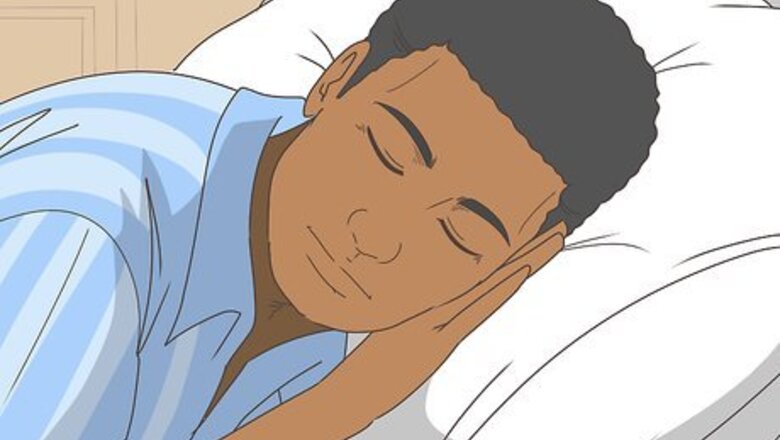
views
- Get rest and stay hydrated so your immune system has the energy to beat the flu virus.
- You can manage flu symptoms with home remedies, like eating soup, gargling salt water, using hot and cold compresses, and humidifying the air.
- Over-the-counter pain relievers and cold medicine can make you feel more comfortable while you get better, but won’t speed up your recovery.
- Get an antiviral prescription from your doctor if you feel severely ill or if your flu gets worse.
Stay home and rest.

Taking it easy when you’re sick helps your immune system fight the flu. As soon as you’re recognize flu symptoms, call in to work or school to let them know you’re sick and need time to recover. While you’re home, just try to relax as much as possible and avoid any activities that take up a lot of your energy. Try to stay away from other people so you don’t get them sick while you’re contagious. Stay home for at least 1 day after your fever is gone. If you need to go out, wear a face mask so you don’t spread the flu. If you have a hard time resting because lying down makes you congested, try using an extra pillow to raise your head.
Drink plenty of fluids.

Drinking water, juice, and other clear fluids prevents dehydration. If you have a high fever from the flu, you’re more likely to sweat and lose moisture. Slowly sip on water or fruit juice throughout the day to keep yourself hydrated. You can also try hot drinks, like caffeine-free tea or warm water with lemon, to rehydrate and relieve a sore throat. Stay away from caffeinated drinks and alcohol while you’re recovering since both could make your symptoms worse. Try an electrolyte drink if you’ve been vomiting or have diarrhea since it will work better to keep you hydrated.
Eat a bland diet.
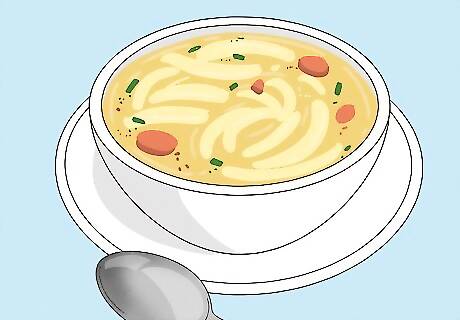
Bland foods will be easier to eat if the flu makes you feel nauseous. If the flu left you a little bit queasy, start by sipping warm broth or making a classic chicken noodle soup since they’re easy to tolerate and can relieve your symptoms. If you’re able to keep soup down, try eating bread, crackers, oatmeal, and other foods that are bland and low in fiber. Have smaller, more frequent meals throughout the day so you don’t make your stomach more upset. Skip greasy, spicy, or processed foods while you’re sick since they’re harder for your body to digest and could make you feel worse.
Gargle salt water.

Gargling salt water alleviates pain from a sore or scratchy throat. Dissolve ¼–½ teaspoon (5.8–11.6 g) of table salt in a glass with 8 fluid ounces (240 ml) of warm water. Just take a sip of the salt water and gargle it in the back of your throat for about 1 minute before you spit it out. Avoid giving salt water to children 6 or under since they may swallow it instead of gargling it properly.
Apply a hot compress to your sinuses.
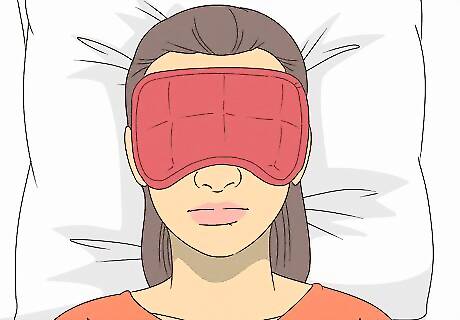
Heat helps drain mucus if the flu made you congested. When you’ve got a stuffy nose, wet a washcloth under warm water and wring it out completely. Set the warm cloth on your face so it covers your nose and the sinus area between your eyes. After a few minutes, try blowing your nose to break apart the mucus so you can breathe easily again. A hot compress can also help relieve muscle pain or headaches, which are other flu symptoms.
Clear mucus with a saline nasal spray.

A saline nasal spray breaks apart congestion caused by the flu. Use a nasal spray whenever you have a stuffy or runny nose caused by the flu. Start by gently blowing your nose before putting the spray nozzle in your nostril. Press the spray nozzle down and breathe in slowly through your nose to help loosen the mucus. Alternatively, you can use a Neti pot to rinse all of the mucus out of your sinuses.
Breathe in steam.

Steam thins out the mucus so it’s easier to blow your nose. One of the easiest ways to treat congestion from the flu is taking a hot shower or sitting in your bathroom while you run your shower. Alternatively, you can heat a bowl of water in the microwave until it starts steaming and lean over it. Take slow deep breaths of the steam to break apart your congestion. Avoid breathing in hot steam from a boiling pot of water since it could burn your airways.
Run a humidifier.
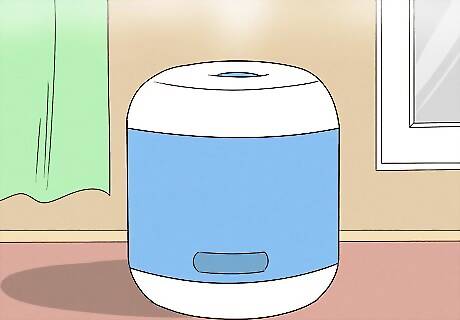
A humidifier relieves a sore throat and opens your sinuses. Dry air can make a sore throat or congestion from the flu feel worse, but a humidifier helps add moisture so you feel better. Run the humidifier the whole time while you’re recovering, and change the water once a day for continued relief. Add 1 tablespoon (15 ml) of vapor rub to your humidifier for even more relief from congestion.
Cool down a fever with a cold compress.
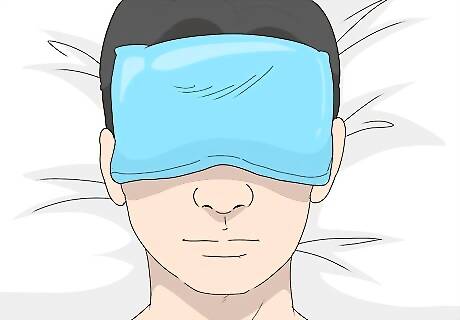
A compress helps bring a fever down without using any medication. Wet a washcloth with clean, cold water and wring it out until it’s damp. Then, just lay the washcloth against your forehead and rest for a few minutes until you start to feel cooler. You can also use an ice pack wrapped in a towel to cool yourself down.
Use pain relievers for aches and fever.
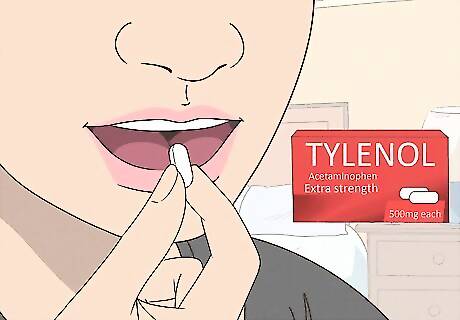
Acetaminophen and ibuprofen help with discomfort caused by the flu. While they won’t make your symptoms go away any sooner, they’ll be a lot more manageable with over-the-counter pain relievers. You can usually take 1 or 2 pain relief pills every 4–6 hours, but follow the directions on the bottle carefully so you don’t exceed the daily recommended limit. You can take acetaminophen and ibuprofen together for extra pain relief. Avoid using medications with aspirin for teenagers and children since it could lead to a fatal condition known as Reye’s syndrome. Avoid taking more than 1,200 mg of ibuprofen or 4,000 mg of acetaminophen within 24 hours.
Take over-the-counter cough and cold medication.
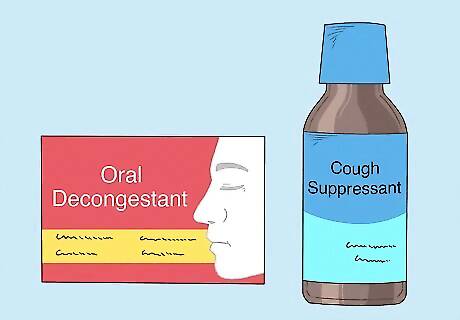
Decongestants and cough suppressants make your flu symptoms manageable. If you’re suffering from a stuffy nose, take an oral decongestant to clear out the mucus so it’s easier to breathe. If you have a sore throat and persistent cough, try a dose of cough suppressant as a pill or syrup so you can get some relief. An expectorant can thin out mucus so it’s easier to blow your nose. Antihistamines can help you if you have a runny nose. Try sucking on cough drops to help treat a cough or sore throat from the flu. Some flu medications also contain pain relievers, so be sure to avoid mixing them with acetaminophen or ibuprofen if you’re already taking them separately.
Try an herbal supplement.
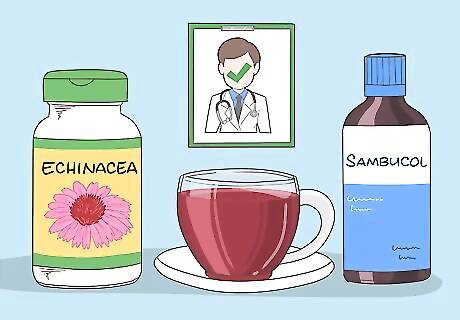
Elderberry and echinacea have antiviral properties that may fight the flu. While there isn’t a lot of evidence on herbal supplements curing the flu, studies have shown that they could be effective against the flu. Consult with a doctor before you start any new supplements to make sure they’re safe with any other medications or supplements you’re using. Take 300 mg of elderberry or echinacea twice each day to help treat the flu.
Get antiviral medication from your doctor.
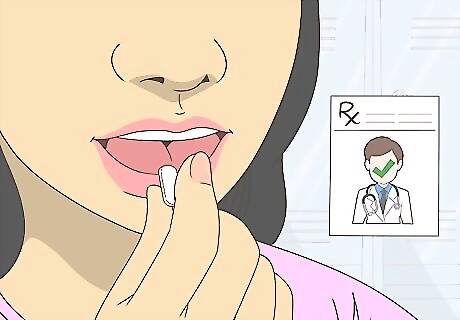
Your doctor may prescribe antivirals for severe flu cases. If you’re feeling extremely sick or if your symptoms get worse, ask your doctor what prescription options are available. You may be able to use antiviral medications to help manage the flu virus and make your symptoms go away. Oseltamivir phosphate is an oral medication that anyone 2 weeks or older can take. Zanamivir is inhaled and available for people 7 and older. Avoid zanamivir if you have respiratory illnesses like asthma. Peramivir is administered through an IV by your doctor and is available for people 2 and older. Avoid any antibiotics since they won’t help treat your flu symptoms.
Seek treatment if you’re extremely sick.
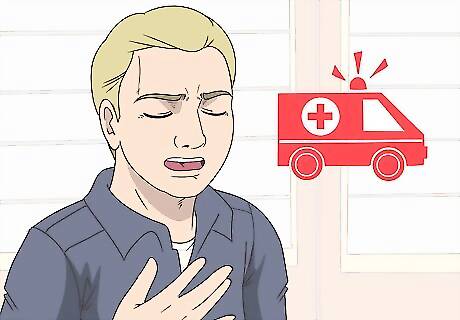
The flu could lead to more complications if your symptoms are severe. If you still have symptoms after 7 days, or if you develop sudden chest pains, have difficulty breathing, or cough up blood, visit your doctor right away. Severe flu could lead to pneumonia, bronchitis, or other infections, but your doctor will be able to give you the treatment you need to start feeling better and recover. You should also reach out to a doctor if you’re 65 or older, pregnant, or have underlying conditions, such as diabetes, heart disease, lung disease, or a weakened immune system.




















Comments
0 comment